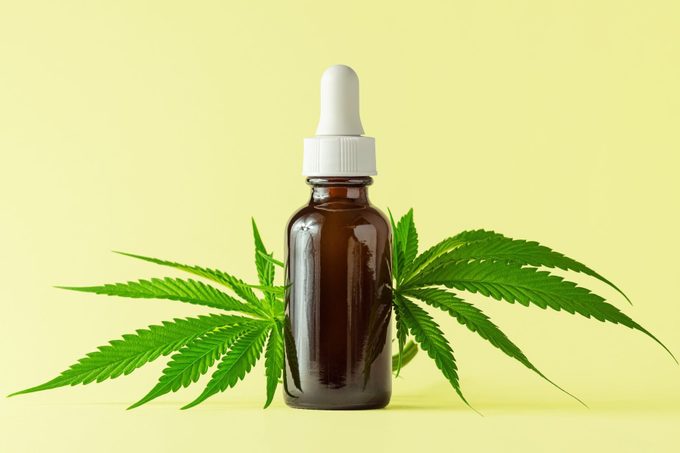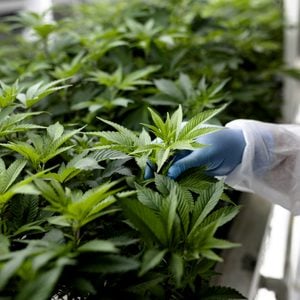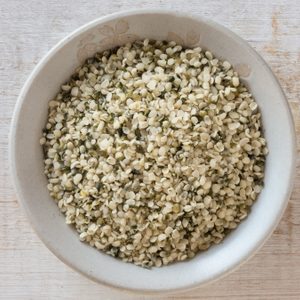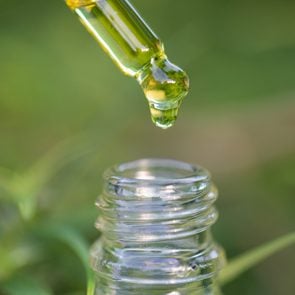Should You Use Hemp Oil? 8 Things Experts Want You to Know
Updated: Jul. 06, 2021
Most CBD oil products these days comes from hemp. This is what you need to know about hemp oil and its potential health benefits.
Our editors and experts handpick every product we feature. We may earn a commission from your purchases.
On This Page
What is hemp oil?
Hemp is a versatile plant.
Parts of it, like the seeds, meet nutritional needs and find their way into our breakfasts, lunches, or dinners. But hemp is also found in products ranging from clothing, handbags, paper, carpeting, soaps and shampoos, and other goods.
People have used hemp this way for centuries, but over the past several years, it’s seen a resurgence.
Hemp oil typically refers to specific products containing CBD (cannabidiol), and it plays an outsize role in the exploding CBD market. Sales of CBD consumer products derived from hemp were around $1.2 billion in 2019, according to market researchers at Nielsen.
CBD oils are a fast-growing part of that market, and most CBD oils that you find in the United States are extracted from the hemp plant.
Here’s what you need to know about hemp oil vs. CBD oil, where hemp oil comes from, what it can be used for, and how to buy a quality product.
Hemp oil is not the same as hempseed oil
The distinction is important. The two oils are sourced from different parts of the plant and have different benefits.
Hemp oil comes from the flowers and leaves of the plant. These days, its prime attraction is its CBD content, which purportedly carries various health benefits.
Hempseed oil comes from the seed and has no CBD or THC. (THC is delta-9-tetrahydrocannabinol, the mind-altering component of marijuana; CBD does not make you high.)
It’s a good source of polyunsaturated omega-3 and omega-6 fatty acids, proven to be good for your heart.
You can also find hempseed in food supplements like hemp milk and hemp protein powder. And it’s used to make varnish, paint, and soap, among other products.
Science also suggests it can benefit the quality of your skin, hair, and nails. (Check out this CBD hemp body lotion review.)

Hemp is not the same as marijuana
Although the hemp plant is a cousin of the marijuana plant, Cannabis sativa, they differ greatly in how much THC they contain and in various other ways. In fact, they are effectively now two separate strains.
“Hemp refers to a specific type of cannabis that has only 0.3 percent THC [or less],” says Kevin Boehnke, a research investigator with the Chronic Pain and Fatigue Research Center at the University of Michigan Medical School in Ann Arbor.
Marijuana contains more than 0.3 percent THC.
Hemp as a source of CBD is a relatively new phenomenon, resulting largely from legal changes brought about by the 2018 U.S. Farm Bill (more on this below).
Hemp and CBD are legal
The difference in THC content that distinguishes hemp from marijuana is partly, if not largely, a legal issue.
The 2018 Farm Bill made it legal to grow hemp with CBD as long as the THC content was no more than 0.3 percent. Hemp itself was defined as any part or derivative of the Cannabis sativa plant.
Anything containing more than 0.3 percent THC is considered marijuana and is still listed on the Drug Enforcement Administration’s list of controlled substances. In other words, it’s illegal on the federal level.
“From a legal standpoint, [hemp products, including hemp oil, that meet the Farm Bill definition] are ‘descheduled,’ so that’s why you can go into a grocery store and buy them,” says Boehnke.
Some states have legalized hemp oil with CBD
But it’s even more complicated than that. CBD still falls into the legal abyss created by varying and sometimes conflicting state and federal laws.
According to the National Conference on State Legislatures, 36 states have legalized medical marijuana and therefore CBD.
In those states, you’re free and clear to use products with THC or CBD from a licensed medical dispensary and with a note from your doctor, says Martin Lee, cofounder and director of Project CBD and author of Smoke Signals: A Social History of Marijuana–Medical, Recreational, and Scientific.
Seventeen states have legalized recreational marijuana in which case “there are no issues legally,” says Lee.
CBD affects the endocannabinoid system
Naturally occurring (endogenous) cannabinoids (such as CBD) play a role in the communication between neurons. Abnormal levels of these endogenous cannabinoids can play a role in health conditions. For instance, clinical studies have noted low levels in women with depression.
“Scientists recognize that diseases are related to a dysfunction in the endocannabinoid system,” explains Lee. “CBD has a potential effect for a wide range of diseases.”
But that’s the theory. “It doesn’t mean if you buy something online all your health problems could potentially be helped,” he adds.
(You may want to know these facts about CBD for depression.)
The health benefits of CBD aren’t scientifically proven
High-quality CBD products may be able to alleviate symptoms, such as pain, insomnia, anxiety, and more, but the science behind these claims is still emerging, says Boehnke.
In other words, we just don’t have that much strong, evidence-based research that hemp oil confers any health benefits. That’s not to say it doesn’t work, just that we don’t know yet.
Lab studies and animal studies (both of which are considered preliminary) hint that CBD may stifle inflammation, which could explain some of its other purported benefits. But, as Boehnke says, “that’s tough to translate into humans.”
Anecdotal evidence for CBD oil
While there isn’t that much rigorous research, there are surveys in which people report having tried and benefited from products such as hemp oil, which contains CBD.
Some of the top medical reasons people say they use CBD are for pain, anxiety, mood dysfunction, and sleep.
In one 2018 survey of more than 2,400 people using CBD, published in the journal Cannabis and Cannabinoid Research, 36 percent of respondents said that CBD treated their condition “very well by itself.”
An Arthritis Foundation survey of 2,600 people with arthritis reported that 79 percent were currently using CBD for arthritis, had used it, or considered using it.
Almost one-third said they currently used a CBD product, including 63 percent who used it every day. And nearly two-thirds said they used CBD in liquid form, which would include oil.
CBD products are still largely unregulated
But buyer beware. The Food and Drug Administration does not regulate products containing CBD.
“In terms of safety and potency, the products are wildly under-standardized,” says Boehnke.
There are a ton of different types of CBD products, including hemp oil, CBD tictures, CBD gummies, and CBD edibles. There are even products like CBD water and bath bombs.
While some companies do a great job policing themselves, others not so much, he cautions.
Look for third-party-tested products
If you decide you want to try hemp-derived CBD oil, it’s incumbent on you to seek out quality, safe products.
Dr. Boehnke stresses the importance of obtaining a Certificate of Analysis (COA) from the company. This provides proof that the product (and hopefully even the batch) has been tested by a qualified third-party lab.
The outside labs also look for contaminants such as pesticides.
Ideally, the company will have the COA available on its website or on a scannable QR code on the packaging. If not, request it. If the company isn’t forthcoming (or you can’t contact them), don’t give them your business, advises Bohenke.
Avoid companies or products that make specific health claims. This is illegal.
Look for U.S.-grown hemp
“At this point, we don’t have a good regulatory structure in the United States,” says Boehnke. “In other places, it might be less stringent, so sticking with U.S. products makes sense at this point.”
Check for medication interactions
Although most verified CBD products are safe, some can interact with medications, so always check with your physician before investing.
You can also check with the National Institutes of Health’s National Library of Medicine to see if any drugs you’re taking are on the list of potential interactions.
Contaminated products can be dangerous
Following the above guidelines will help you purchase a product that’s not just high quality but also safe—one that will pose little risk of an overdose.
But there are hemp oil (and other CBD) products out there that are contaminated. One man who gobbled down two packages of CBD gummies he’d bought at a gas station ended up in the intensive care unit with heart and breathing problems, according to a 2020 case study in Cureus.
It’s unclear exactly what was in the gas station gummies, but synthetic cannabinoids are a particular worry.
“They can be much more dangerous than CBD,” says Boehnke. “They can cause a lethal overdose.”
(Here’s a buyer’s guide for the best CBD gummies.)
Expect a lot more information—scientific, legal, and otherwise—to be forthcoming in the not-too-distant future.
“As time goes on, we’re going to see a lot more hemp products,” says Boehnke. “It grows fast—there’s a reason they call it weed—[and] it has a lot of valuable and interesting properties.”



